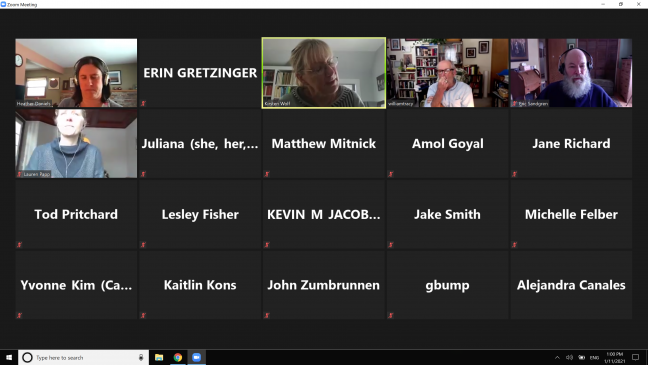University of Wisconsin students discussed preliminary action to create a task force for pandemic-related grading policies Monday afternoon with members of the University Committee.
About two dozen individuals, besides University Committee members, UW administrators and media, met at the virtual committee meeting to discuss potential paths forward in ongoing debates over a blanket pass/fail policy for the fall and spring semesters.
UW will not enact fall pass/fail option despite students’ continuing advocacy
Students were allotted half an hour to bring their concerns forward through Associated Students of Madison Chair Matthew Mitnick. After meeting with Vice Provost John Zumbrunnen, Dean of Students Christina Olstad and other administrators, Mitnick said these conversations led to the idea of creating a task force dedicated to creating pandemic-related grading policies.
Mitnick said ASM is currently drafting legislation to propose the task force’s creation. The legislation will be voted on Jan. 26 in ASM and if it passes, student representatives will take it to faculty representatives in the Faculty Senate on Feb. 1 to be amended, Mitnick said.
The legislation would outline the boundaries of the task force’s governing power and member composition. Tasked with handling pandemic-related grading policies, Mitnick said the body of students, ASM representatives and faculty members would tackle issues like pass/fail and inclusive time zone learning options.
“We feel that this is somewhere where if we’re talking about true shared governance, if we’re talking about finding that common ground, if we all have some sort of say on those very specific pandemic-related policies, we feel like we can be in a much better situation than we were last semester,” Mitnick said.
University Committee member Eric Sandgren offered to represent the University Committee on the task force and work with Mitnick and other students on developing more concrete responsibilities and a representative member structure.
Sangren said he believes the task force needs to resolve issues surrounding communication of pass/fail policies, infrastructure for enacting pass/fail and equity issues so students do not “fall through the cracks.”
UW Chancellor Rebecca Blank said at the last University Committee meeting that UW would not enact another blanket policy in part because there is a process in place for students to seek a pass/fail grade through their advisors.
In response to this point, Mitnick said at the meeting that he received upward of 70 messages from students advocating for a pass/fail option in which some students expressed concerns about the advisor component of the current pass/fail option.
ASM calls on UW to pay telecommuting workers, implement pass/fail grading option
Mitnick said students reported a lack of responses and miscommunication issues that impacted their ability to attain a pass/fail grade through the advisor process. The proposed ASM legislation would advocate for a pass/fail option for students that would be contingent on students’ having to meet with an advisor first, Mitnick said.
Though the choice would ultimately be up to the student, Mitnick said he believed this option met administrators’ desires to have advisor involvement in the process.
In the last University Committee meeting, Blank said another one of the reasons the university would not enact a pass/fail policy was because of an upward trend in grades for the fall semester. Sandgren said this point should be examined by the task force because it does not address students who are struggling.
“Trends are important to give you a sense for how many, but the policies have to be there for those who are having problems, no matter how many,” Sandgren said. “So in that sense, I don’t think trends really matter as much.”
Students who spoke at the meeting raised concerns about equity issues and claimed the university was inconsistent in its reasoning to not support a pass/fail option.
UW junior Juliana Bennett said the administration tried to place the blame on students for not bringing the issue to the table sooner, despite the fact that students have been discussing pass/fail since the spring.
Bennett also refuted a claim made by Blank in the last meeting about “no evidence that students have been disadvantaged this fall,” noting that “every person on the planet” was disadvantaged due to the pandemic. Mitnick said he hoped the University Committee would endorse a plan to give governing power to a task force and would support students’ endeavors for a pass/fail policy.
While Mitnick said he hopes the task force would discuss policy options on pass/fail for both the spring and fall, University Committee chair Kirsten Wolf said the fall semester was a “moot point,” and Wolf said they were more open to discussing solutions for spring 2021.
UW student Amol Goyal said at the meeting that trends do not account for existing opportunity gaps exacerbated by the pandemic’s conditions and online learning — factors Goyal said should still be considered for the implementation of a policy in the spring and the fall.
UPDATED: UW adopts Pass/Fail option in response to COVID-19, online classes
“There were still disruptions brought to students’ academic well-being at the end of the fall semester that wasn’t necessarily accounted for in the previously existing pass/fail policy,” Goyal said. “We still believe that … [pass/fail] can still be looked into or recommend SD/UD grading for the fall semester and the spring semester.”
While Mitnick pushed for more time with the committee to discuss the issue, Wolf said Sandgren would work with Mitnick and others to compose a plan before they would take official action endorsing the task force. Wolf said she encouraged students to continue bringing concerns about pass/fail to them through Mitnick.














